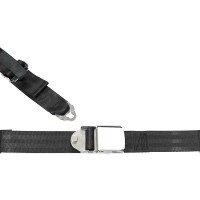1-877-795-2278 | info@aircraftspruce.ca
Aircraft Spruce Canada
Brantford, ON Canada
Corona, CA | Peachtree City, GA
Chicago, IL | Wasilla, AK
Aircraft Spruce Canada
Brantford, ON Canada
Corona, CA | Peachtree City, GA
Chicago, IL | Wasilla, AK
FREE SHIPPING ON ORDERS OVER $699 (SOME EXCLUSIONS APPLY) | 877-795-2278
Pby-5A Catalina Model 1/72
$371.00/Each
Part# 13-10589
MFR Model# CO872
MFR Model# CO872
Overview
|
This high quality replica is handcrafted from mahogany and comes with a wooden base. Length is 10-3/4" and wingspan is 16-3/4". Scale is 1/72. The PBY-5 Catalina is one of the variants of PBY Catalina, an American and Canadian built flying boat in 1930s and 1940s. PBY is the abbreviation of Patrol Bomber Consolidated. The PBY-5 could be equipped with depth charges, bombs, torpedoes and .50 caliber machine guns. The PBY Catalina is one of the most use aircraft in World War II since it can play multiple roles. This aircraft was released in July 1943 with higher power engines discontinued use of propeller spinner and standardized waist gun blisters. The PBY-5 Catalina was one of the most successful patrol flying boats of the US Navy. On December 20, 1939, The US Navy ordered 200 PBY-5 Catalinas. The PBY-5 could fly at a maximum speed of about 282 kph at an altitude of about 2,128 m or 7000 feet. It has a service ceiling of about 4469 m or 14700 feet and the pilot could fly at a distance of about 4097 km without refueling. As the demand for Catalina aircraft increases, the Consolidated contracted various companies to build license versions of the PBY-5. Some of these companies were the Naval Aircraft Factory, Boeing Aircraft of Canada, Canadian Vickers Factory, Canadian Vickers Ltd and the OA-10A. The PBY-5 and all other earlier versions of PBY Catalina were true flying boats which mean that it cannot land on any medium except water. The very main feature that makes the PBY-5 Catalina sleeker than many flying boats is the way the wingtip floats retract to fair into the wing while in cruising flight. |
Q&A
Please note, Aircraft Spruce Canada's personnel are not certified aircraft mechanics and can only provide general support and ideas, which should not be relied upon or implemented in lieu of consulting an A&P or other qualified technician. Aircraft Spruce Canada assumes no responsibility or liability for any issue or problem which may arise from any repair, modification or other work done from this knowledge base. Any product eligibility information provided here is based on general application guides and we recommend always referring to your specific aircraft parts manual, the parts manufacturer or consulting with a qualified mechanic.

 Aircraft Spruce Canada
Aircraft Spruce Canada






